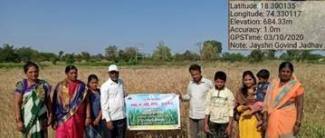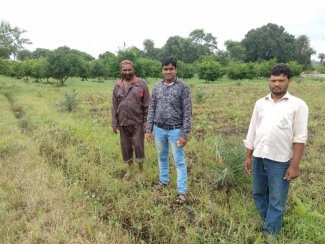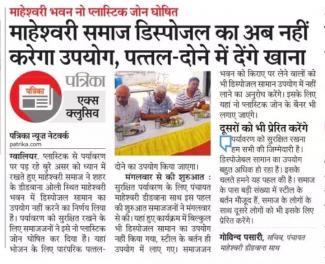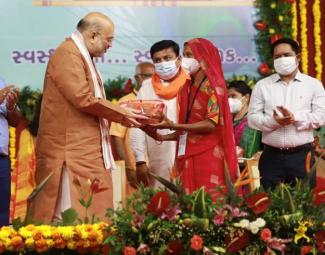
हिन्दी में भी यह समाचार आगे पढ़े....
Scientists from Agharkar Research Institute (ARI), Pune, an autonomous institute under the Department of Science & Technology, Government of India, have developed a biofortified durum wheat variety MACS 4028, which shows high protein content.
The wheat variety developed by the ARI scientists group on Wheat improvement, shown high protein content of about 14.7%, better nutritional quality having zinc 40.3 ppm, and iron content of 40.3ppm and 46.1ppm respectively, good milling quality and overall acceptability.
MACS 4028, the development of which was published in the Indian Journal of Genetics and Plant Breeding, is a semi-dwarf variety, which matures in 102 days and has shown the superior and stable yielding ability of 19.3 quintals per hectare. It is resistant to stem rust, leaf rust, foliar aphids, root aphids, and brown wheat mite.
The MACS 4028 variety is also included by the Krishi Vigyan Kendra (KVK) programme for United Nations Children's Fund (UNICEF) to alleviate malnutrition in a sustainable way and can boost the Vision 2022 “Kuposhan Mukt Bharat”, the National Nutrition Strategy. An endeavor to tackle the hidden hunger in the rural areas of India is being continued using traditional plant breeding approach to achieve “Kuposhan Mukt Bharat.”
The wheat variety MACS 4028 has been notified by the Central Sub-Committee on Crop Standards, Notification and Release of Varieties for Agricultural Crops (CVRC) for timely sown, rainfed condition of Peninsular Zone, comprising Maharashtra and Karnataka. Indian Council of Agricultural Research (ICAR) has also tagged this variety under the Biofortified category during the year 2019.
Wheat crop in India is grown under six diverse agroclimatic zones. In the peninsular zone of India (Maharashtra and Karnataka states), wheat cultivation is majorly done under rainfed and limited irrigation conditions. Under such conditions, the crop experiences moisture stress. Hence, there is a high demand for drought-tolerant varieties. Efforts for the development of high yielding, early maturing varieties with good quality and disease resistance for rainfed conditions are carried out at Agharkar Research Institute, Pune under All India coordinated Wheat and Barley improvement programme, coordinated through Indian Institute of Wheat and Barley Research Karnal governed by the Indian Council of Agriculture Research. The MACS 4028 is an outcome of such intervention for the farmers.
(For more details please contact: Dr Yashavanthakumar K. J, Email: [email protected])
एआरआई, पुणे के वैज्ञानिकों ने बायोफोर्टीफाइड, उच्च प्रोटीन वाली गेहूं की किस्म विकसित की
भारत सरकार के विज्ञान और प्रौद्योगिकी विभाग के अंतर्गत एक स्वायत्तशासी संस्थान, पुणे के अगहरकर रिसर्च इंस्टीट्यूट (एआरआई) के वैज्ञानिकों ने एक प्रकार के गेहूं की बायोफोर्टीफाइड किस्म एमएसीएस 4028 विकसित की है, जिसमें उच्च प्रोटीन है।
गेहूं की किस्म में सुधार पर एआरआई वैज्ञानिकों के समूह द्वारा विकसित गेहूं की किस्म में लगभग 14.7% उच्च प्रोटीन, बेहतर पोषण गुणवत्ता के साथ जस्ता (जिंक) 40.3 पीपीएम, और क्रमशः 40.3 पीपीएम और 46.1 पीपीएम लौह सामग्री, पिसाई की अच्छी गुणवत्ता और पूरी स्वीकार्यता है।
एमएसीएस 4028, जिसे विकसित करने की जानकारी इंडियन जर्नल ऑफ जेनेटिक्स एंड प्लांट ब्रीडिंग में प्रकाशित की गई थी, एक अर्ध-बौनी (सेमी ड्वार्फ) किस्म है, जो 102 दिनों में तैयार होती है और जिसमें प्रति हेक्टेयर 19.3 क्विंटल की श्रेष्ठ और स्थिर उपज क्षमता है। यह डंठल, पत्तों पर लगने वाली फंगस, पत्तों पर लगने वाले कीड़ों, जड़ों में लगने वाले कीड़ों और ब्राउन गेहूं के घुन की प्रतिरोधी है।
एमएसीएस 4028 किस्म को संयुक्त राष्ट्र अंतर्राष्ट्रीय बाल आपात कोष (यूनीसेफ) के लिए कृषि विज्ञान केन्द्र (केवीके) कार्यक्रम द्वारा भी स्थायी रूप से कुपोषण दूर करने के लिए शामिल किया गया है और यह "कुपोषण मुक्त भारत", राष्ट्रीय पोषण रणनीति की संकल्पना 2022 को बढ़ावा दे सकता है। भारत के ग्रामीण क्षेत्रों में अप्रत्यक्ष भूख से निपटने का एक प्रयास जारी है जिसमें "कुपोषण मुक्त भारत" के लक्ष्य को हासिल करने के लिए परम्परागत पौधों की प्रजनन पद्धति का उपयोग किया जा रहा है।
गेहूं की किस्म एमएसीएस 4028 को फसल मानकों पर केन्द्रीय उप-समिति द्वारा अधिसूचित किया गया है, महाराष्ट्र और कर्नाटक को शामिल करते हुए समय पर बुवाई के लिए कृषि फसलों की किस्में जारी करने (सीवीआरसी), प्रायद्वीपीय क्षेत्र की बारिश की स्थिति के लिए अधिसूचना जारी की गई है। भारतीय कृषि अनुसंधान परिषद (आईसीएआर) ने भी वर्ष 2019 के दौरान बायोफोर्टीफाइड श्रेणी के तहत इस किस्म को टैग किया है।
श्रीमती जयश्री गोविंद जाधव, एक महिला किसान, जो महाराष्ट्र के पुणे के मोरगाँव जिले में बायोफोर्टीफाइड गेहूं की किस्म एमएसीएस 4028 की खेती के माध्यम से अपने परिवार की पोषण सुरक्षा सुनिश्चित करती है।
भारत में गेहूँ की फसल छह विविध कृषि मौसमों के अंतर्गत उगाई जाती है। भारत के प्रायद्वीपीय क्षेत्र (महाराष्ट्र और कर्नाटक राज्यों) में, गेहूं की खेती प्रमुख रूप से वर्षा आधारित और सीमित सिंचाई परिस्थितियों में की जाती है। ऐसी परिस्थितियों में, फसल को नमी की मार झेलनी पड़ती है। इसलिए, सूखा-झेलने वाली किस्मों की उच्च मांग है। अखिल भारतीय समन्वित गेहूं और जौ सुधार कार्यक्रम के अंतर्गत, अगहरकर रिसर्च इंस्टीट्यूट, पुणे में वर्षा की स्थिति में अधिक पैदावार वाली, जल्द तैयार होने वाली और रोग प्रतिरोधक क्षमता वाली किस्में विकसित करने के प्रयास किए जाते हैं। यह भारतीय कृषि अनुसंधान परिषद द्वारा नियंत्रित भारतीय गेहूं और जौ अनुसंधान संस्थान, करनाल के जरिये संचालित है। एमएसीएस 4028 किसानों के लिए इस तरह के प्रयासों का परिणाम है।
( अधिक जानकारी के लिए कृपया सम्पर्क करें : डा. यशवंतकुमार के. जे, ईमेल: [email protected])











